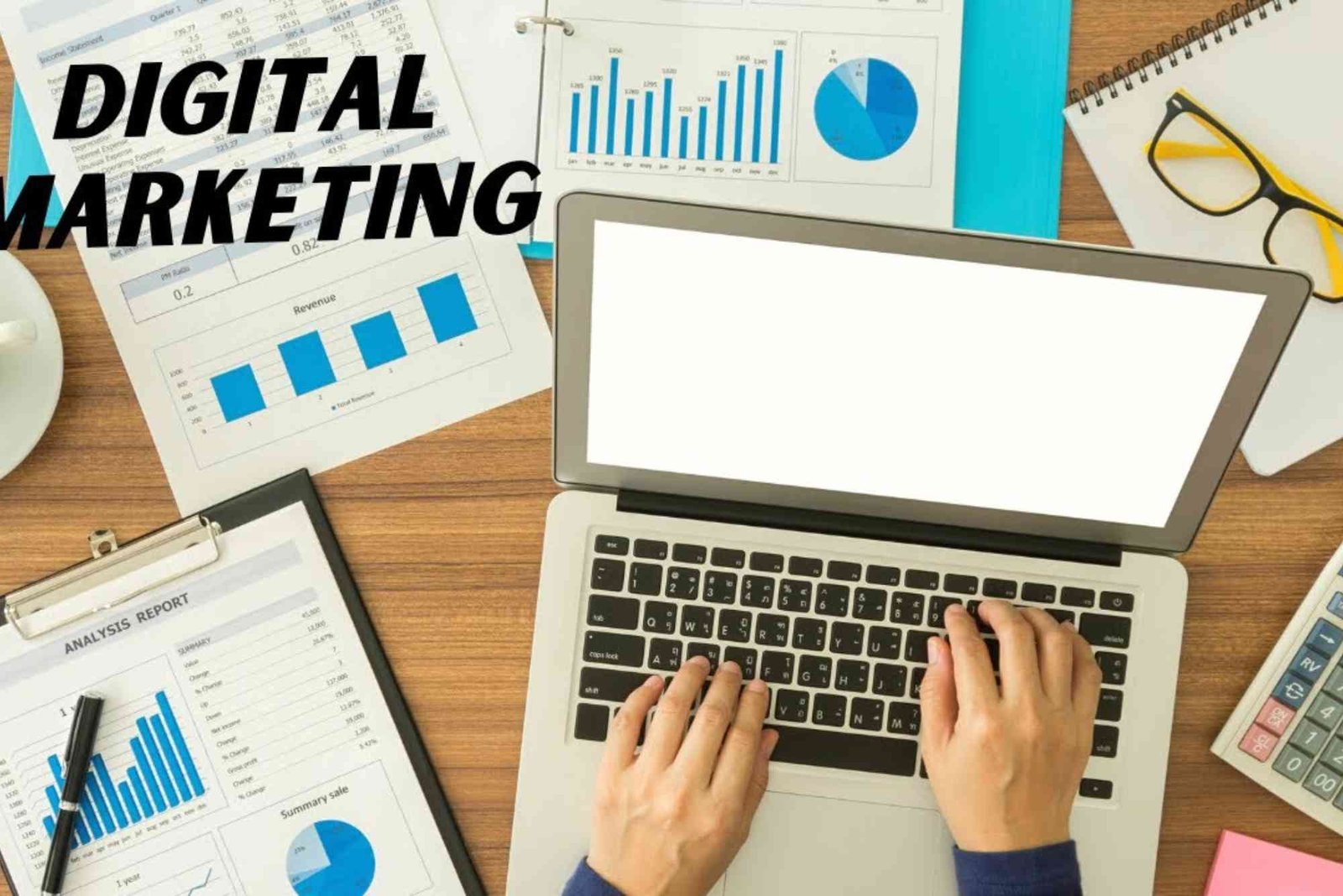If you’ve ever wondered what digital marketing actually means and how it helps businesses grow, you’re not alone. In today’s online world, nearly everything revolves around digital interaction — from social media posts to online shopping ads. Understanding digital marketing is the first step toward mastering how brands reach and engage with customers in the digital era.
In this beginner’s guide to digital marketing, we’ll break down what it is, why it’s important, how it works, and how you can start applying it — even if you’re completely new. Whether you’re a small business owner, a student, or simply curious, this guide will give you a solid foundation to build your skills.
What Is Digital Marketing?
Digital marketing is the practice of promoting products or services through digital channels such as search engines, websites, email, social media, and mobile apps. Unlike traditional marketing, which relies on print or TV ads, digital marketing focuses on online platforms where audiences spend most of their time.
The goal of digital marketing is to connect with customers where they already are — online — using data-driven strategies to attract, engage, and convert them. In short, it’s marketing powered by the internet.
Why Digital Marketing Matters in 2025
The modern customer’s journey starts online. Before buying anything, people search, compare, and read reviews. Businesses that fail to establish an online presence risk losing visibility and credibility. Digital marketing helps bridge that gap by making your brand visible in search results, social media feeds, and inboxes.
It’s not just for big companies either. Small businesses can reach large audiences without massive budgets. Through well-planned campaigns, even local businesses can compete with global brands. The data you collect through digital marketing also gives insight into what works — allowing constant improvement.
Key Components of Digital Marketing
Digital marketing has many moving parts. Each element plays a role in reaching potential customers and building trust. Let’s explore the main components that make digital marketing effective.
Search Engine Optimization (SEO)
SEO helps your website rank higher in search engines like Google. When people search for information or products, optimized websites appear first. Effective SEO combines keyword research, quality content, and technical improvements to ensure your site is visible and relevant.
When you understand what digital marketing is, SEO becomes your foundation — because visibility drives all other results.
Content Marketing
Content marketing focuses on creating valuable and relevant content that attracts and retains an audience. Blogs, videos, podcasts, and infographics are common examples. Instead of pushing products directly, content marketing builds authority and trust.
By sharing helpful content, you guide users naturally toward your products or services without sounding overly promotional.
Social Media Marketing
Social media marketing uses platforms like Instagram, Facebook, LinkedIn, and TikTok to engage with audiences. It’s an excellent way to build brand awareness, communicate directly with customers, and share stories that humanize your brand.
Consistency and authenticity are key. A clear social strategy helps you connect emotionally, not just sell.
Email Marketing
Email marketing remains one of the most powerful digital tools. It lets businesses communicate directly with customers who already show interest. Personalized emails nurture relationships, promote offers, and keep your audience informed.
When used wisely, email marketing drives higher engagement than most other channels.
Pay-Per-Click Advertising (PPC)
PPC advertising, often used with Google Ads or social platforms, allows you to display ads to targeted audiences. You pay only when someone clicks on your ad. It’s a fast way to attract visitors and generate leads while complementing organic strategies like SEO.
A mix of paid and organic marketing ensures consistent visibility across channels.
How Digital Marketing Works
Digital marketing starts with understanding your target audience. You identify who your customers are, what they need, and where they spend time online. Once you have that insight, you create tailored campaigns using the right channels — such as search engines, social media, or email.
Every campaign’s performance is tracked through analytics tools. This data shows what’s working and what’s not, allowing you to refine your strategy. Unlike traditional marketing, digital marketing gives you real-time feedback — helping you make smarter decisions faster.
Benefits of Learning Digital Marketing
Learning digital marketing opens countless opportunities. It’s one of the most in-demand skills across industries. Businesses of every size need digital marketers to manage online presence, ads, and content.
For entrepreneurs, mastering digital marketing means more control over your brand. You don’t need to rely solely on agencies — you can experiment, analyze, and scale campaigns yourself.
And for job seekers, it’s a skill that guarantees career flexibility. Whether you want to specialize in SEO, social media, or analytics, the digital marketing field offers continuous learning and growth.
Common Digital Marketing Mistakes to Avoid
Beginners often try to do everything at once — which leads to scattered results. The key is to focus on strategy over volume. Posting more doesn’t always mean better engagement. Another common mistake is ignoring analytics. Without data tracking, you can’t measure success.
Also, avoid using too many platforms without understanding where your target audience actually is. It’s better to be consistent on two or three platforms than to be irregular on ten.
Lastly, remember that digital marketing takes time. SEO rankings, content traction, and social trust don’t build overnight. Consistency and patience deliver long-term success.
How to Start Learning Digital Marketing
Starting with the basics is the best approach. Begin by understanding key terms — SEO, content marketing, PPC, and social media engagement. Then, apply what you learn through small projects. You can experiment by creating a blog, managing a social media page, or running a small ad campaign.
Online learning platforms, free certifications, and blogs like HubSpot offer in-depth resources. Stay updated with trends, because digital marketing evolves constantly.
If you want a summarized overview, check out this what do you know about digital marketing — quick guide.
Real-World Application: Orange Theory Example
Let’s take Orange Theory Mountain View as a practical example. This fitness studio leverages digital marketing through social media, SEO, and community-driven content. By targeting local keywords and promoting fitness challenges online, they engage local audiences while strengthening brand visibility.
This shows how even location-specific businesses can thrive using digital strategies. The key lies in blending authenticity with consistency.
Future of Digital Marketing
As technology advances, digital marketing becomes even more personalized. Artificial intelligence, voice search, and data automation are shaping the future. Marketers can now predict user behavior and deliver tailored content instantly.
However, authenticity will always matter more than automation. People still connect with stories, not algorithms. The brands that balance personalization with human touch will stand out.
FAQs About Digital Marketing
What are the main types of digital marketing?
The main types include SEO, content marketing, social media marketing, email marketing, and PPC advertising.
Is digital marketing hard to learn?
Not at all. With consistent practice and curiosity, anyone can learn digital marketing. Start small and build gradually.
How long does it take to see results?
Results vary by channel. SEO might take months, while PPC and email can bring faster returns. Consistency is crucial.
Do small businesses need digital marketing?
Absolutely. It’s one of the most affordable and measurable ways to grow brand awareness and reach customers.
What skills do I need for digital marketing?
You’ll need creativity, analytical thinking, communication skills, and a basic understanding of digital tools.
Start Your Digital Journey Today
Now that you understand what digital marketing is and how it works, it’s time to take action. Digital marketing isn’t just about ads — it’s about connecting meaningfully with your audience. Whether you’re promoting a brand, building a career, or starting a business, these strategies will help you stand out online.
To continue learning, browse more marketing & advertising articles and stay updated with the latest trends. Remember — every expert started as a beginner. Start today, experiment, and watch your digital presence grow.








